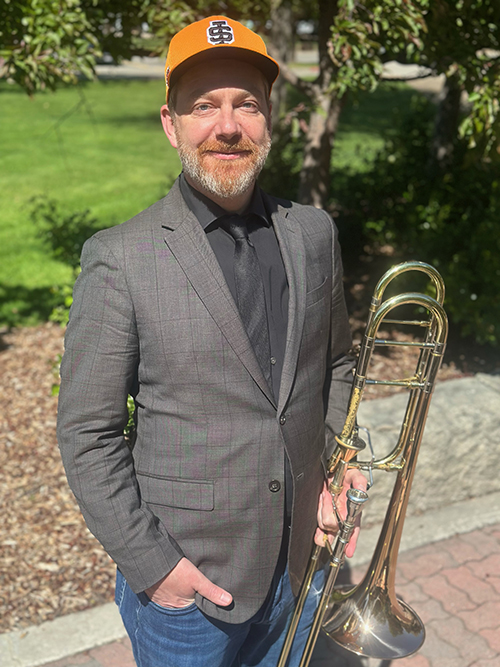ISU Bands: The Soundtrack of Campus Life
July 24, 2025
Luke Strother is “very excited to be the new guy in town.”
As a kid, Strother, who only ever considered a career in music, imagined himself as a rock star before turning his interest toward orchestral trombone. Later, he experimented with arranging, producing, and film scoring.
“It’s always been music,” he said, “but I never saw myself as a conductor. However once the opportunity presented itself I couldn't imagine doing anything else.”
Now, Strother joins Idaho State University as visiting assistant professor and director of the Concert and Athletic Bands, as well as applied trombone instructor. He will lead the marching band, wind ensemble, and pep band while also teaching trombone, his principal instrument.
Strother’s debut performance in Pocatello came during a scorching summer Concerts in the Park with the Pocatello Municipal Band, where he was invited to conduct a march.
“I’ve done plenty of those summer outdoor concerts where the only folks in the audience are a few wives and girlfriends of the performers,” he says. “To see the community come out is really exciting.”
Born and raised in Boise, Strother has strong ties to Idaho’s music scene and knows many of the state’s high school band teachers. For the past 12 years, he ran the band program at the College of Idaho.
“Coming here is exciting,” he says. “It’s a bigger school, a bigger music program, higher athletic division, more people who will see the band.”

Strother believes that band holds a unique place in collegiate music as a distinctly American art form, tracing its roots back to John Philip Sousa’s Marine Band. “It’s our tradition,” he says. “Most of the highest level music making in the band world happens at our colleges and universities. If you imagine the soundtrack to university life, there’s going to be a marching band.”
He also notes that athletic bands are often the community’s first introduction to collegiate music. At ISU, ensembles like the marching band are open to all students, not just music majors. “You’ve just got to show up and do the work,” he says. “We’ve got a great cross-section of students in these groups. It’s a vibrant community.”
For many students, band becomes an important part of their college experience. “You make friends for life,” he says. “For many kids it can be a defining part of their time on campus.”
Strother finds time to perform on trombone, where he is currently second trombonist for Opera Idaho and principal trombonist for the Brass Band of Treasure Valley. One benefit of his new role is the ability to continue performing in Boise.
“Everybody I’ve met in the Department of Music has been extraordinarily welcoming, kind, and gracious, and the few students I’ve met so far seem similarly excited and engaged,” he says. “It feels like it’s going to be an excellent place to work.”
Strother emphasizes “student-led accountability,” encouraging students to show up and learn their parts not just for themselves, but for the success of the ensemble.
“One of the great things about large ensemble music-making is that the performance is successful only when everyone is contributing,” he says. “There’s no ‘star quarterback’ in a band. It’s a community effort.”
Strother plans to focus on building camaraderie and raising the musicianship of ISU’s bands. “We record all of our concerts and when students listen back, each concert should sound like an improvement from the previous one,” he says. “It establishes a standard that we’re playing at and you never want to go backwards.”
During his interview for the position, Strother conducted the wind ensemble and was impressed by the talent he saw. “We’ve got phenomenal musicians here,” he says.
His first year will focus on listening and learning from students and the community. “Idaho State has the opportunity to be one of the great regional university marching bands,” he says. “A big part of growing a program is the relationships off-campus with high school bands, being available to go to their classrooms, being available and present in the community.”
Future plans include taking the marching band on the road with the football team and giving band students opportunities to experience live, world-class performances.
“In Idaho we’re a bit sheltered as far as what music students have access to see live,” he says. “Seeing the New York Philharmonic in person is radically different than listening to them online. If there’s an opportunity to perform and hear excellent live music, that would be great.”
For Strother, the purpose of music ensembles is not just to train professionals. “What we are hoping all of our students leave with, whether they’re music majors or not, is a deep sense of appreciation for the arts, in developing whole people who are interested in a community,” he says. “The camaraderie and empathy that is developed in musicians makes for good citizens. If we’re developing an art-conscious empathetic community, we’re doing our jobs.”
Strother loves working with college students. “It’s glorious to see them develop on their instrument, and see their personal development,” he says. “We want to see you get through the program, grow as a person, succeed, graduate, go on and take your first steps, whatever those are. Seeing students succeed is the most inspiring bit.”
For details on how to join an ensemble at ISU, visit isu.edu/music or contact music@isu.edu, (208) 282-3636. Upcoming events will be added to the ISU calendar soon, so keep an eye out for performance updates at isu.edu/calendar.
Categories:
